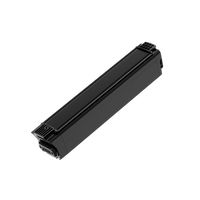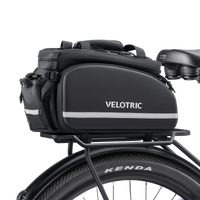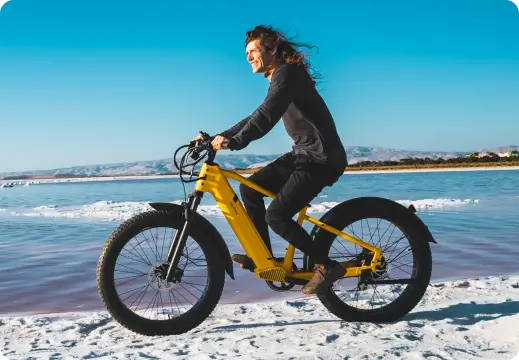If you’re looking for gorgeous scenery to explore with an electric bike, look no further than Pennsylvania. The Keystone State is home to plenty of picturesque parks and trails, like the Great Allegheny Passage, a 150-mile trail from Cumberland, Maryland, to Pittsburgh, Pennsylvania.
If you’re traversing a trail that covers multiple states like this one, it’s essential to look up the electric bicycle laws in all relevant states. Every jurisdiction has its own regulations. Read on for a primer on Pennsylvania ebike laws.
Information based on Pennsylvania Vehicle Code §102 and the Department of Conservation and Natural Resources (DCNR) guidelines.

What’s legally considered an ebike in Pennsylvania?
Before we talk about the Commonwealth of Pennsylvania’s vehicle code and ebike laws, it’s important to clarify what’s considered an electric bicycle under Pennsylvania law. Unlike most states, Pennsylvania doesn’t regulate ebikes according to a classification system (like Class 1, Class 2, and Class 3 ebikes).
Instead, Pennsylvania has blanket rules for ebikes and doesn’t differentiate between types of bikes based on characteristics like motor power. That said, the state has precise conditions for what qualifies as an ebike.
At the very basic level, Pennsylvania defines an ebike as a two-wheeled bicycle with operational pedals plus electric assist (an ebike motor). The motor source can power a pedal assist system (PAS) or throttle assist. In addition, to qualify as an ebike, the vehicle must meet these criteria:
- The bike can’t weigh more than 100 pounds.
- The ebike can’t have a motor power of more than 750W.
- When using the motor, the bike can’t exceed a speed of 20 miles per hour (mph).
Ebike laws in Pennsylvania
Pennsylvania ebike laws regulate everything from where you can ride to whether you need to wear a helmet. Here’s a quick roundup of some essential Pennsylvania bike laws.
Where are you allowed to ride ebikes in Pennsylvania?
Pennsylvania laws allow ebikes wherever traditional bicycles are allowed, including normal bike paths, bike lanes, and roadways. Ebikes may also be allowed on sidewalks if expressly permitted by the relevant local regulations.
Can you ride ebikes in Pennsylvania state parks and forests?
The Pennsylvania Department of Conservation and Natural Resources (DCNR) allows ebikes on trails wherever traditional bikes are allowed. Ebikes are also allowed on motorized trails and public roads unless otherwise noted.
However, there are some caveats to using your ebike on nonmotorized trails managed by the Department of Conservation and Natural Resources. For example, you can’t engage throttle assist and must pedal (but pedal assist is still OK).
Additionally, some specific areas are closed for cycling, including natural areas and hiking trails. When in doubt, check with the regulatory body about the trail or park you’re interested in.
For example, federal parks and game lands have their own rules.
How old do you have to be to ride an ebike in Pennsylvania?
You must be at least 16 years old to ride an ebike in Pennsylvania. However, you don’t have to pass a licensing exam (like with a motorized vehicle) to start cycling. As soon as someone turns 16, they can ride an ebike.
What class of ebikes are legal in Pennsylvania?
There are different classes of ebikes, which differ in terms of characteristics like motor power and functionality. As mentioned, Pennsylvania law doesn’t distinguish between different categories of ebikes.

Still, it can help to understand the different ebike classes, especially if you’re looking to buy your first electric bicycle. Here’s a quick overview of the generally accepted ebike classifications:
- Class 1. Class 1 ebikes are low-speed and can’t go faster than 20 miles per hour (mph). The motor engages if the cyclist is only pedaling (which is why Class 1 e-bikes are sometimes called pedelecs or pedalcycles).
- Class 2. Class 2 ebikes also can’t go more than a maximum speed of 20 mph. Like Class 1 e-bikes, they have a PAS, and the motor can be engaged while pedaling. However, Class 2 bikes also have throttle assist, which allows the motor to engage and power the bike forward even when you aren’t pedaling.
- Class 3. Class 3 ebikes can go as fast as 28 mph. They have pedal assist and may or may not have throttle assist. Most Class 3 e-bikes come with a speedometer to monitor speeds.
Our guide to electric bike motors has more details about motors, how they work, and their relationship to ebike classifications. Whether you ride for commuting or adventure, make sure your ebike meets Pennsylvania safety standards. Explore Velotric’s compliant and comfortable electric bikes.
Do you need to wear a helmet when riding an ebike in Pennsylvania?
State laws regarding helmet use while e-cycling vary. In Pennsylvania, all cyclists under 12 years of age must wear a helmet. Since you can only ride an electric bicycle from 16 and up, there are technically no helmet requirements for ebike riders.
Still, wearing a helmet is a smart decision that can help keep you safe in an accident. Learn more about the importance of helmets with our state-by-state helmet law guide.
Do you need a license to ride an ebike in Pennsylvania?
You don’t need a special license to operate an ebike in Pennsylvania. You also don’t need to register the ebike (like with a normal car) or get insurance for the bike.
That said, insurance can be a good idea. A comprehensive coverage package can cover everything from bike repairs to medical bills in case you’re in an accident.
Local ordinances for ebikes in Pennsylvania
So far, we’ve talked about some far-reaching Pennsylvania ebike laws. However, each municipality may have its own laws regarding the use of ebikes. It’s important to consult your local government for details. You can start by checking with your DMV or police department.
For example, Smedley Park in Delaware County, Pennsylvania, has a complete ebike ban.
What you should know before riding your ebike in Pennsylvania
The first step when e-biking in Pennsylvania is to research the use of electric bicycles in the area you want to ride. Once you’ve acquainted yourself with the rules of the road, there are a few more tips you can use to make your e-cycling experience a great one:
- Do your research into popular bike trails. Pennsylvania has plenty of mountain bike trails that are well-suited for ebikes. Examples include Rattling Creek (22.3 miles, accessible from Lykens), Roth Rock Tour (25.5 miles, accessible from State College), and Lackawanna State Park (15 miles, accessible from Scranton).
- Make sure your bike is in good shape. You don’t want to head out on a trail ride to discover you have a technical issue halfway through. Make sure you’re maintaining your ebike properly and getting regular tuneups. Our guide to ebike maintenance covers the essentials.
- Dress for the season. Pennsylvania is a four-season state that gives you a full range of weather. Dress accordingly. Our guide to dressing for the season while cycling covers all the basics. For example, in cooler seasons, it’s best to dress in layers that you can peel off as you warm up while riding.
Experience a Velotric ebike in Pennsylvania
The perfect Pennsylvania ride starts with the perfect ebike. Velotric has you covered. If you’re looking for a UL-certified, Class 2 compliant ebike that meets Pennsylvania regulations, the Velotric Discover 3 is a great fit for daily commutes.
This article is for informational purposes only and does not constitute legal advice.
Data Sources
The above information is sourced from these websites and was last updated in November 2025. If you have any questions, you can visit the following sites directly for confirmation.
Pennsylvania State Law
- Pennsylvania Consolidated Statutes – Title 75 §102: Definition – Pedalcycle with Electric Assist (≤750W, ≤20mph, 16+)
- Pedalcycle rules of the road
- Sidewalk rules
DCNR(State Parks / Forest Trails)












































1 comment
Can you legally operate an e bike under a d u I suspension